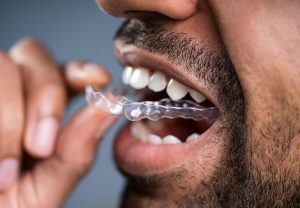Stress and Oral Health – An Interview with Dr. Karagiorgos

It’s summertime and the living is easy…except the reality is that many of our patients are dealing with increased stress and anxiety levels from the past year. This has had an impact on oral health as well, with patients reporting jaw clenching, teeth grinding, as well as cracked teeth. Fortunately, there are ways FDA can help. We talked with Dr. Karagiorgos about the impact of stress on the mouth and what treatment options are available for patients.
Have you noticed any changes in your patient’s oral health during Covid?
Dr. Karagiorgos: Most definitely. While maybe a few people started flossing and brushing more regularly as they saw themselves more on ZOOM conferences for work or family gatherings, the pandemic has had a negative impact on oral health for most patients. Tooth decay, plaque and gum disease did not stop during the pandemic. Small cavities turned into bigger cavities, big cavities turned into root canals. Some teeth that needed root canals turned into tooth extractions.
Also, people have been under a lot of stress. Stress and anxiety are bad for people’s health in general, and teeth and jaws are no exception. As a result of this increase in stress and anxiety, we are seeing a lot more clenching and grinding in patients. Some people are aware of it — they catch themselves clenching or grinding their teeth during the day — but many are clenching while they are sleeping and are not even aware they are doing it. I often ask patients if they sleep next to someone because that person might know more about their grinding or clenching habits than they themselves do.
Other questions I ask that may reveal a night grinding or clenching habit include:
- Do you wake up with sore teeth?
- Do you wake up with a sore jaw?
- Do you suffer from headaches?
- Do you suffer from neck muscle spasms?
What are your recommendations for patients who clench or grind their teeth?
Dr. Karagiorgos: The most important thing to reduce the ill effects of clenching and grinding is to recognize that it is happening. We can work with patients to develop a treatment plan, as well as help find resources and support for relaxation. For example, a warm compress on the jaw is helpful and there are exercises patients can do before bedtime to help relax their jaw.
However, since nighttime clenching and grinding is happening subconsciously, patients might continue the behavior despite their best attempts to curb it. I am a big believer in the benefits of a custom night guard; it’s an insurance policy to protect natural teeth, crowns and fillings, and especially dental implants. Like the old adage says… an ounce of prevention is worth a pound of cure. This is definitely true in teeth! I would much rather replace worn out mouth guards than have to repair damaged teeth!
What does getting a night guard entail?
Dr. Karagiorgos: It’s a simple procedure: We take a mold of a patient’s teeth and create a mouth guard specifically suited to the structure of their mouth and teeth to be worn while sleeping. We design these night guards to direct and dissipate the forces created when clenching and grinding, something that the over-the- counter versions cannot. Custom night guards also provide a much better fit than options you can find at a store, which means it will be more comfortable and less likely to dislodge while sleeping.
counter versions cannot. Custom night guards also provide a much better fit than options you can find at a store, which means it will be more comfortable and less likely to dislodge while sleeping.
That said, over-the-counter versions are a great tool to help a patient learn to sleep with a night guard. We want to know that it is something a patient can and will use before going through the process and dealing with the cost of creating a custom night guard. Night guards don’t work if they are sitting in a drawer collecting dust!
If a patient has a cracked tooth from grinding or clenching, what options do they have?
Dr. Karagiorgos: Dental bonding is the most common procedure to help smooth out or repair damaged teeth. We use a special tooth-like material that adheres quickly to teeth and can be polished and shaped to match your other teeth.
One thing to note is that a cracked tooth could be obvious or not so obvious. A piece of tooth might chip off and leave the tooth sharp to our tongue, or a cracked tooth might be completely intact but cause sensitivity to hot or cold, to biting on it, or to releasing pressure after biting. Small chips and cracks in your teeth could become larger over time, so if you have any concerns or are experiencing any of these systems, please give us a call. Dr. Brunacini and I are happy to talk to you about your concerns. We are here to help!
Thank you Dr. Karagiorgos!
If you are experiencing stress-related symptoms like a sore jaw or teeth, or have noticed a cracked tooth, please give us a call at 207.781.5900 so we can help! Our team of compassionate professionals will work with you to find a treatment plan that supports your oral health needs. Let us help you get back to that easy summertime living!

